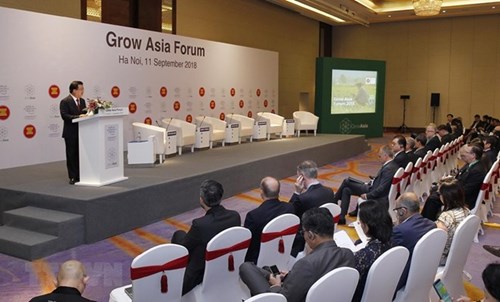The forum brought together leaders of agriculture ministries from member countries of the Association of Southeast Asian Nations (ASEAN), multinational and global corporations, and companies operating in agriculture in the ASEAN region in general and Vietnam in particular.
With 18 sessions, the event focused on agricultural finance, digital innovation in agricultural production, agriculture and the fourth Industrial Revolution, precision technology in agriculture and low-emission agriculture, among others.
    |
 |
|
Vietnamese Deputy Prime Minister Trinh Dinh Dung speaking at the Grow Asia Forum. |
In his opening remarks, Vietnamese Deputy Prime Minister Trinh Dinh Dung said agriculture is a key economic sector of most of ASEAN countries, noting that agro-forestry-fishery production not only ensures food security in the region with a combined population of 650 million but also contributes to global food security.
To integrate more intensively and extensively, the agricultural sector needs to make stronger changes, with the broader participation of the private sector and application of cutting-edge technologies of the fourth Industrial Revolution, towards more modernity, efficiency, inclusion and sustainability, he stressed.
Dung said agricultural cooperation is one of the most important contents of the ASEAN Economic Community in order to increase market access capacity of farm produce, develop product chains and promote the participation and benefits of farming households.
The Deputy PM listed an array of measures such as enhancing strategic cooperation in agriculture in ASEAN through bilateral, multilateral and regional collaboration, establishing potential agricultural links in the region, and intensifying direct investment and strategic partnerships between producers, customers and commercial businesses.
The Grow Asia Forum aims to set up partnerships to support ASEAN countries in fulfilling the WEF’s New Vision for Agriculture’s targets of increasing food production by 20 percent, lowering greenhouse gas emissions by 20 percent, and reducing rural poverty by 20 percent by 2030.
The targets will be completed by connecting concerned parties like Governments, businesses and farmers, especially via the Public Private Partnership (PPP), he said.
Dung went on to say that Vietnam considers the PPP model an important tool to attract investment in agriculture and develop production, focusing on value chains and in-depth processing.
Under the action plan on agricultural restructuring by 2020, the Vietnamese Government has put agriculture at the centre of sustainable economic development, adaptation to climate change and prosperous rural area building.
Science-technology and the PPP investment model would be factors that help Vietnam realize its goals of sustainable agricultural and rural development, he said.
Apart from Governments and farmers, businesses serve as the most dynamic factor in the value chain since they organize the production, processing and consumption of agricultural products, especially amidst the fourth Industrial Revolution.
The Deputy PM expressed his belief that the participating managers, experts and businesses will work together to seek innovation methods in agriculture, utilizing agricultural advantages in the region, improving people’s living standards and contributing to ensuring global food security in the face of climate change.
Source: VNA